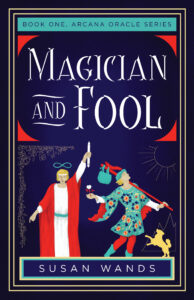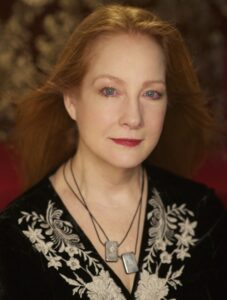Launch: Susan Wands’s Magician and Fool: Book One, Major Arcana Series
INTERVIEW BY MARTHA HOFFMAN
Susan Wands is a writer, tarot reader, and actor who graduated from the University of Washington with a degree in theater and women’s studies and has acted professionally across the United States and on Broadway. As a co-chair with the NYC Chapter of the Historical Novel Society, she helps produce monthly online book launches and author panels. In London, she has lectured at Watkins Books and at Atlantis Books and has presented at the Occulture Berlin Festivals. Her first book in a series, Magician and Fool: Book One, Arcana Oracle Series is published today by SparkPress.
How would you describe your book in a few sentences?
As the gifted young empath Pamela Coleman Smith gathers inspiration to create a unique tarot deck for theexplorers of the occult known as the Golden Dawn, magic simmers and rivalries reach dangerous heights.
 What first drew you to the subject of this circle of followers of the occult?
What first drew you to the subject of this circle of followers of the occult?
Since high school, I have been interested in tarot cards but I wasn’t familiar with the creator of the deck, Pamela Colman Smith, since her name wasn’t on the Rider Waite tarot deck. There was a pamphlet inside with a little of her life’s story but it was only after reading Mary K. Greer’s book, Women of the Golden Dawn: Rebels and Priestesses, that I had any understanding of a magical society called the Golden Dawn in Victorian London.
Many works of historical fiction provide a list indicating which characters are historical and which are imagined. Are any of your characters not real figures in the historical record?
A few of my characters are mashups of real-life people. I did gently remind a friend who was doing a shout-out to all the famous friends of Pamela Colman Smith that one of them she was acknowledging, Satish Monroe, was made up for my book and not an actual friend. I’m glad she thought he was a real character though! Satish is my version of Ira Aldridge, a Black American-born British actor, playwright, and theatre manager, known for his portrayal of Shakespearean characters, who died in 1867, thirty years before Satish appears in my series.
Does this book stay close to historical accounts of these individuals and events?
Magician and Fool is what I would call “Alternate History” in that I take some of the events, such as the death of a character, and postpone it by three years so that Pamela can interact with him. But other aspects (Pamela’s age when she might have had her first psychic episode, her time in Jamaica, and her sailing to London with the Lyceum Theatre in 1900), are true to her age at the time.
What was your research like for this book?
I loved doing the research for this book, which included a Mystical Britain tour, visiting Cornwall and Stonehenge; courses on the Italian Renaissance to understand where the first tarot deck originated; contacting Jamaican artists to see if they knew anything about Pamela’s time there; and tracking down Pamela’s family and artwork. It’s all been a labor of love.
This novel generally takes magic as an accepted reality. Even though some of the characters go through a bit of effort to create or summon it, you present it fairly literally and concretely. Is that your sense of magic in the world? Is that how these persons in real life saw it?
Here’s my take on magic: magic is real and personal to me but not necessarily provable. During the existence of the Golden Dawn, the interest in science and magic opened up the idea that anything was possible. Electricity, astral travel, travel by balloon or airplane, magical battles and evocations of gods, these subjects were being explored intensely and the line between science and magic was (and still is!) blurred.
Do you differentiate between the strenuous magic that male characters draw forth and the seemingly inherent talents and gifts of Pamela Coleman Smith?
Great question! The laborious magic that some of the male characters are trying to conjure comes from their desire to own, to dominate, to command magic. Pamela’s second sight and conjuring abilities flow through her because she seeks communion and expression rather than dominance. Fire and Water!
What is the connection between acting and the seekers of the occult?
Transformation is the key between acting and the occult! When you’re really channeling someone on stage, and I’ve had that experience a handful of times in my stage career, it is akin to channeling magic. It is as close to astral travel or communing with other energies as I’ve even known.
 Both as a reader and as someone who writes, I am always curious about a writer’s process. What was the first scene you pictured in this book? Do you outline a story or do you start with an image or idea and work your way out?
Both as a reader and as someone who writes, I am always curious about a writer’s process. What was the first scene you pictured in this book? Do you outline a story or do you start with an image or idea and work your way out?
I was obsessed with scenes of Pamela’s childhood experiences in Jamaica, with the folklore stories she was taught, and then with the Lyceum Theatre’s stage magic. Her experiences with second sight, seeing fairies, ghosts, and experiencing synesthesia all inspired my overall idea that she was in search of her muses for a tarot deck. So I wrote all of those scenes first. But then I am a complete pantser, in that I write inspired from one chapter to the next, and then edit, dismantle and build new chapters. Having good writing groups and editors is essential for me!
Since this is Book One of a series named Major Arcana, do you want to give us a preview of what comes next?
I just approved the cover art of the next book, High Priestess and Empress, this past week with SparkPress, who will be putting out the second book in the series. Pamela’s next two muses will be Ellen Terry and Florence Farr, from the worlds of the Lyceum Theatre and the Golden Dawn, each with important lessons to teach her. The third book, Emperor and Hierophant, is in final edits. I plan to write an eleven-book series based on the Major Arcana, or first twenty-two cards, of the Smith Waite tarot deck.
I am assuming Wands is not a pen name! Is there any connection between your name and the content of this book?
Yes, Wands comes from my father’s Scottish side of the family, and since I was called “Magic Wands” from a young age, this may have pointed me in the direction of all things magical. My grandmother, Goldie Wands, was a practical person except when a Ouija board was brought out. Her story of the Ouija board spelling out “Lola in the lake,” a reference to a missing relative, has stayed with me to this day.
![]()






